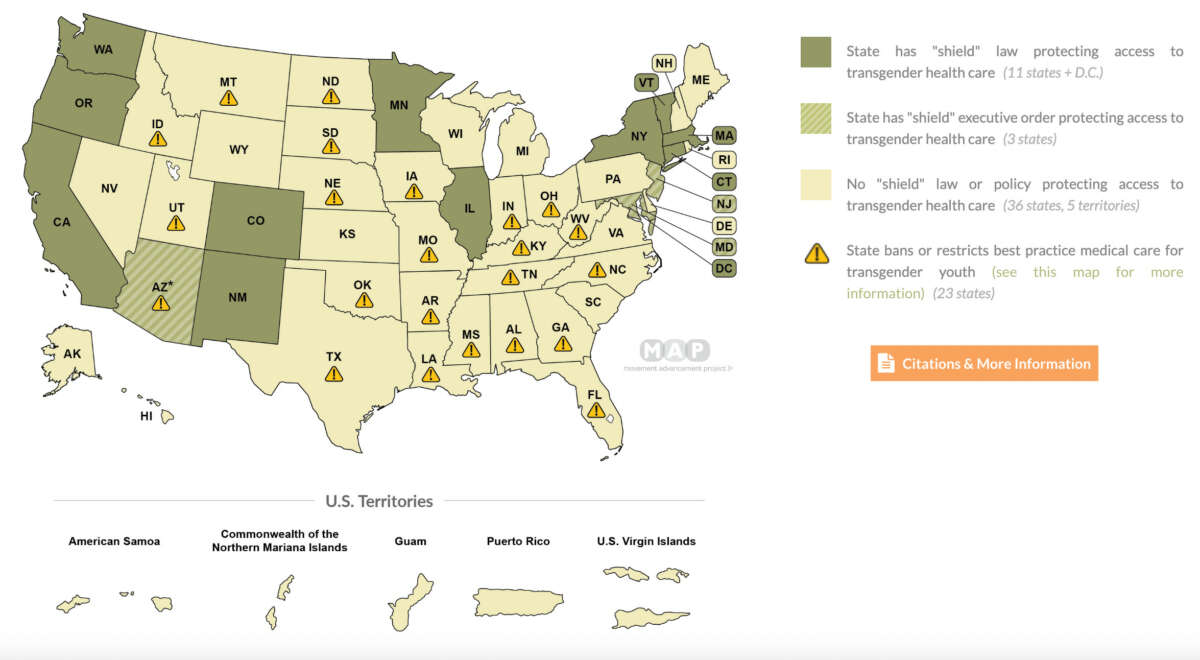On Thursday, Maryland’s Senate Finance Committee heard Senate Bill 119, a bill that would make Maryland a sanctuary state for transgender individuals and providers fleeing other states. The bill would add gender-affirming care to a law passed last year that shields abortion patients and providers from out-of-state prosecution and investigations. Many more individuals testified in favor of the bill than against it, including Maryland state government officials who remarked on its necessity. If passed, the law would make Maryland the 12th state, not counting the District of Columbia, to do so.
The bill includes several protections for transgender individuals. It would block the enforcement of out-of-state subpoenas for medical records and information on transgender patients who seek care within Maryland’s jurisdiction. It would also prevent foreign financial judgments from other states attempting to sue Maryland providers. It would prohibit liability insurers from taking adverse action against healthcare providers for providing gender affirming care. Additionally, it would block the extradition of individuals who have received gender-affirming care in Maryland. Lastly, it specifies that the state cannot use state funds to provide “information, spend time or money, or use state facilities, state property, state equipment, state personnel, or other state resource” in aiding investigations around gender affirming care – a virtually total barring of any enforcement of anti-trans laws in the state.
The state joined several others in providing protections for patients and providers when Governor Moore signed an executive order in June to enact many of these policies. Heather Forsyth spoke on behalf of the office of the Maryland Attorney General in favor of the bill at the hearing, stating that this bill would go farther than that executive order: “It’s both critical and urgent… The executive order provided some protections, but it couldn’t offer many of the protections this legislation would provide.”

Among the things she stated this bill would do beyond Governor Moore’s executive order:
- It would prevent liability insurance from taking adverse action on providers for providing gender affirming care.
- It would ensure license and regulatory boards could not take adverse actions for providing gender affirming care.
- It would place limits on subpoenas, wire tapping, ex parte and foreign judgments that target care provided within the state of Maryland
- It would go into law and protect transgender people regardless of who holds the Governor’s office.
Forsyth was not the only one to speak on behalf of the bill from the Maryland executive branch. Ryan Moran, representing the Maryland Department of Health, also testified to the importance of the bill, emphasizing that “Maryland remains a leader in supporting trans people’s rights to equitable healthcare and safety.” Moran highlighted the growing list of Republican states banning gender-affirming care as a reason for the bill’s necessity: “These list of states are growing… the states include criminal penalties against health officials providing gender-affirming care.”
The hearing also saw testimony from representatives of large hospitals and medical associations. Michael Huber, representing Johns Hopkins University and School of Medicine, asserted that gender-affirming care is “medically necessary, lifesaving, evidence-based, and age-appropriate healthcare.” Pam Kasemeyer, testifying on behalf of the state medical society, the Academy of Pediatrics, the Mid-Atlantic Community Health Centers, and the American College of Obstetricians and Gynecologists, stated that the bill was needed due to “legal challenges and fear” from out-of-state actors targeting care in the state.
These challenges and investigations are indeed unfolding. Recently, Attorney General Ken Paxton made national headlines by subpoenaing the medical records of patients who traveled from Texas to Seattle Children’s Hospital for gender-affirming care. Similar subpoenas have been issued to gender-affirming care clinics in other states. Meanwhile, 19 Republican state attorneys general have signed a letter asserting their right to medical information from other states, indicating that this tactic may be employed against both transgender individuals and those seeking and providing abortions moving forward.
Only a three people testified against the bill – one concerned citizen, a representative from the Maryland Family Institute, a religious organization, and Health Choice Maryland, an anti-vax organization.
The bill will need to pass a committee vote before moving to the full senate floor in the coming days.
This piece was republished with permission from Erin In The Morning.
We have 9 days to raise $50,000 — we’re counting on your support!
For those who care about justice, liberation and even the very survival of our species, we must remember our power to take action.
We won’t pretend it’s the only thing you can or should do, but one small step is to pitch in to support Truthout — as one of the last remaining truly independent, nonprofit, reader-funded news platforms, your gift will help keep the facts flowing freely.
